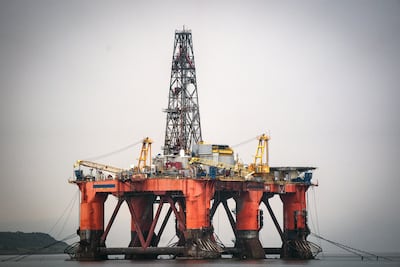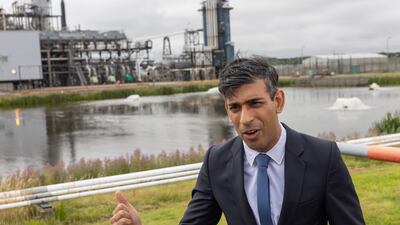UK Prime Minister Rishi Sunak announced a new push for North Sea oil and gas on Monday as he looks to draw a dividing line on environmental policies before an election next year.
Mr Sunak has insisted he wants to “max out” developments in the North Sea, as he claimed Labour’s refusal to support new oil and gas fields would be “bad for the British economy”.
The Prime Minister spoke out as he travelled to Scotland to announce government support for future oil and gas licensing rounds.
And while he refused to say if the Rosebank field to the west of Shetland – the development of which is fiercely opposed by environmental campaigners including Greta Thunberg – would be approved, his remarks hinted that it could.
Asked about the Rosebank field during a visit to Aberdeenshire on Monday, Mr Sunak stressed that “individual licensing decisions are made through a regulatory process”.
But he added: “My view is we should max out the opportunities that we have in the North Sea because that’s good for our energy security, it’s good for jobs – particularly here in Scotland – but it’s also good for the climate, because the alternative is shipping energy here from halfway around the world with three or four times the carbon emissions.
“So, any which way you look at it, the right thing to do is to invest and to back our North Sea and that’s what we’re doing.”
With Labour having said it would not give new fields the go ahead if Keir Starmer wins the next general election, Mr Sunak insisted his rival’s policy was “bad for our energy security”.
Continuing his criticism of Labour, the Tory insisted the refusal to support new developments in the North Sea was a “bad” decision, economically and environmentally.
Labour’s policy would make the UK “more reliant on energy that comes from abroad”, the Prime Minister said.
“It’s bad for the economy and jobs – 200,000 jobs are supported by this industry, many of those here in Scotland – they would be putting people out of work,” Mr Sunak said.
“And, thirdly, it’s bad for the environment because if you look at the research that’s been published today – LNG [liquefied natural gas], for example, that comes here from somewhere else, typically has carbon emissions that are three, if not four times, higher than the energy that we can get from here at home.
“So, any which way you look at it, I don’t think that’s the right policy. What we’re doing is right for the country.”
Regulators at the North Sea Transition Authority are currently running the 33rd round of offshore oil and gas licensing, with more than 100 licences in total expected to be awarded from this autumn onward.
Another licensing round was announced last year after Russia’s invasion of Ukraine threw Europe’s gas market into turmoil and led to a push for domestic energy production.
Mr Sunak insisted this was “consistent with our ambitions” for the UK to achieve net-zero emissions by 2050, adding that oil and gas would still be needed to supply about a quarter of the UK’s energy needs by then.
“Given that, the question you have to ask yourself is where would you like to get that energy from, and it seems to me unequivocally the right thing is to get that energy from here at home,” he said.
The latest announcement comes as Mr Sunak’s Conservatives look to exploit misgivings about environmental policies that helped them to a surprise victory in a London by-election this month.

Trailing in the polls, the party has spied an opening after Labour Mayor Sadiq Khan’s support for expanding an ultra-low emission zone in London was widely blamed for the by-election result.
Although ministers say Britain’s 2050 net-zero goal is still in sign, Mr Sunak has positioned himself as a friend of the motorist and the Conservatives have accused the Labour opposition of siding with Just Stop Oil activists.
Mr Sunak said on Monday that a 2030 deadline to stop selling petrol cars remained in place but that he would push for net zero in “proportionate and pragmatic way”.
The 2030 plan is “about new cars, not all existing cars. So it’s the sale of new cars. That’s been the government’s policy for a long time. It remains the government’s policy,” Mr Sunak told BBC Radio Scotland.
Energy Secretary Grant Shapps said in a social media post that the new oil and gas drilling amounted to “saying no to Just Stop Oil and their political wing the Labour Party”.
“We will power ahead with new oil and gas because it’s in the best interests of the British people, of our economy and of our national security,” Mr Shapps said.
Labour said it would “take no lessons” on energy security from a government that has been reluctant to expand onshore wind or embrace energy efficiency measures.
“Every family and business is paying the price in higher energy bills of 13 years of failed Tory energy policy,” said Labour's climate spokesman Ed Miliband.
The North Sea Transition Authority, which oversees oil and gas production, said using Britain's reserves was cleaner than imports because of different methods of extraction and transmission in some countries.
A new analysis suggesting domestic gas was four times cleaner “highlights the benefits of continuing to produce our own gas, as cleanly as possible, for as long as we consume it”, said the authority's director of strategy Hedvig Ljungerud.
Carbon capture backed
Two new sites, in north-east Scotland and the Humberside coast of England, have been chosen to host carbon capture facilities. Two have already been announced. The use of carbon capture is planned to begin from the mid-2020s.
The technology involves capturing and compressing the gases emitted by power stations and storing it deep underground or in the sea.
Ministers are offering up to £20 billion ($25.7 billion) to support the growth of carbon capture, which the government says could support 50,000 jobs.


